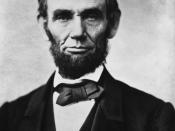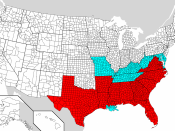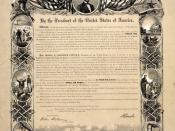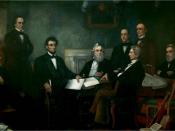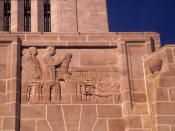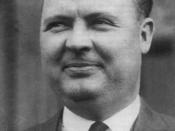From the start of the American Civil War until the end of Reconstruction, the United States of America endured what can be considered a revolution. During this time many constitutional and social developments brought about great change in the country. Some constitutional developments that caused conflict were the Emancipation Proclamation, three civil rights bills, and the reconstruction, while some social developments which could potentially lead to a revolution were the Freedmen's Bureau, the Black Codes, and the Ku Klux Klan. Together these events did put the country in a revolution.
Prior to 1860 the United States was already split into opposing sides fighting for power. Although these conflicts never reached the battlefield, the slaves states and free states were always competeing for representation in congress. Each side wanted more states for them to get more representation. To prevent too much conflict, they decided on numerous compromises such as the Missouri Compromise and the Compromise of 1850.
Although these did ease tensions to some degree, they were only delaying the enedible. It started when Abraham Lincoln was voted as president. South Carolina was the leader of the southern states and began the cesession of the states. After Lincoln was inaugurated in 1860 seven states ceded from the Union and soon after four more joined them. The south believed that they had the constitutional right to cede. (Doc A) South Carolina feared that the north would gain enough power over the south that they would abolish slavery in the south. South Carolina felt that their powers were being smuthered so they had no choice but to cede from the Union. This of course was the start of a very bloody war for both the northern and souther states. This conflict led to the Emancipation Proclamation and the freeing of the slaves in the south. However this was only the beginning of the revolution which the nation was going through.
The end of the Civil War marked the end of the bloodshed but the beginning of reconstruction of the nation. The United States still had many issues to address. One such issue was the new banking and currency systems. Senator John Sherman felt that the country was not nationalized enough. (Doc B) He felt that America would prosper more if it had its own unique exchange system. As opposed to different states doing their own things which is why the government could be overthrown.
Although the slaves were finally freed, things were still rough for the freedmen. (Doc C) Some Africans felt that they were being betrayed by their government. He did not understand how after they have fought for their nation and government, they are still eligle to vote for their representatives. In the petition it explains how they are treated unfairly in court and how the courts will not even receive negro testimony. At that time the government was not too willing to help out the freedmen. Gideon Welles, Lincoln's Secretary of the Navy wrote in a diary that the Federal Government has no control of whether or not blacks can vote or not. (Doc D) He felt it was entirely up to the states to decide if they vote or not. The Federal Government has done it job by freeing the state and sufferage is not their issue. And some states took advantage of this with things like the Poll Tax, Literacy Test, and Grandfather Clause, which prevented blacks from being able to vote. The few that could afford the Poll Tax most likely could not read, and if they did it was highly unlikely that their grandfather voted since slaves were not even considered citizens of the United States from the Dred Scott decision. This does not mean that there were no efforts to support the freedmen. The Freedmen's Bureau was set up to help blacks do things like read and write so they could be more equal to the whiteman. In a petition to the Bureau and the President, the Freedmen of Disto Island stated that they were promised land from the government but have yet to see it. (Doc E) It goes on to the President asking how they can be so kind and supportive to the rebellious south and not to those who have been loyal to the Union during times of war. They have been put from one bad situation into another and the government has done very little about it. Although slavery was over things were not different when the south implemented the Black Codes which made the blacks a second class citizen. These codes put limits on the new freedom of the black man. However the Civil Right Act of 1866 tryed to fight these codes for the freedmen. This act gave the Federal Government the ablilty to protect the freedmens' civil rights from being violated. Senator Lot Morrill of Maine made a speech in Congress about his opinion on the matter. He felt that the act was absolutely revolutionary, but the nation is in the middle of a revolution also. The whole nation is changing with the end of slavery and through Reconstruction. (Doc F) He states that the principle of the government are all changing during this time period. Eventually these things helping out the freedmen have some effect. (Doc G) On the front cover of Harper's Weekly on November 16, 1867, it shows a black voting at the ballot and is titled the First Vote. This could have been due to the passing of the Force Acts of 1870 which authorized federal troops to rid the nation of organization such as the Klu Klux Klan. Some disliked these acts and they were most likely whites from the south. Some felt that it put too much power in the central government and allowed them to intrude into business that was not theirs. (Doc H) However the Force Acts were necessary during this time. the Klu Klux Klan was making life for the former slaves even worse than times of slavery. (Doc I) Thomas Nast shows this through his art. All these things had a huge effect on the lives of the freedmen of the nation as also the nation as a whole since the freemen were now offical citizens of the United States no matter what state they were in.
However some may see that this time period was not another revolution that our nation has been through. This is because despite all the efforts made for the new freedmen of the nation, once reconstruction ended things in a way went full circle and the blacks were once again at the mercy of the whites. This can apply to states in the north and in the south although much more so in the south. It applys in the north as well because people like the Irish were competeing for jobs in the north.
As one can see during the years 1860-1877, many developments both constitutional and social put the nation through a revolution. These things have changed the country greatly not just for the blacks but also the whites and for the nation as a whole.
